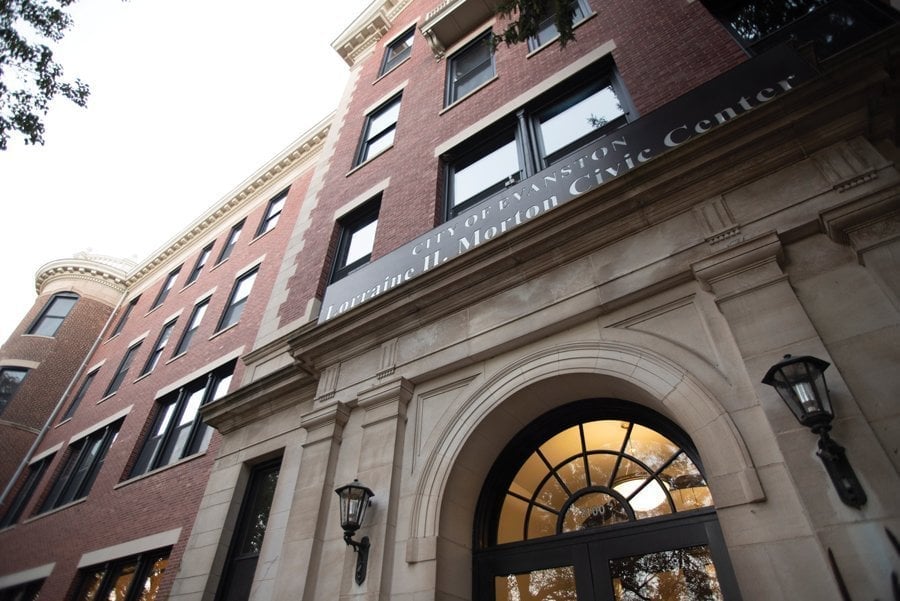Evanston, Northwestern community alliance push for greater University investment in city
Daily file photo by Colin Boyle
The Lorraine H. Morton Civic Center.
June 4, 2023
As Northwestern seeks approval from City Council for the Rebuild Ryan Field project, conflicts around the rebuild reflect tense town-gown relations.
The University has continuously engaged in performative investments often with lack of community input, according to Lesley Williams, president of the Community Alliance for Better Government. She said it is important that community members respond to NU through organizing.
“The way we deal with Northwestern is the same way we would deal with any corporation that is pursuing development projects that are not necessarily in the best interest of the community,” Williams said.
Evanston residents, NU students and local organizations formed the Northwestern Accountability Alliance in early May to express community concerns about the new stadium.
The alliance currently has support from about 11 organizations, including CABG, Most Livable City Association, Fossil Free NU and NU Graduate Workers.
The group is concerned with the potential “damage (on) the livability of Evanston and surrounding communities,” as NU expands into a “for-profit entertainment complex,” according to the NU Accountability Alliance instagram.
The Rebuild Ryan Field project proposes decreasing the stadium’s maximum capacity by 12,000.
In a community outreach meeting in April, Community and Citizenship Director of Turner Construction Company — one of two companies NU decided would oversee the Rebuild Ryan Field project — Pamyla Fountain-Brown said the company considered removing barriers that “have historically kept local minority- and women- owned businesses” from large construction projects as it moves forward with the proposal.
“It really seemed that Northwestern already had this clear notion of what they wanted to do, of what they planned to do,” Williams said. “They’re exploiting community concerns about things like systemic racism to justify this project.”
Parielle Davis, a 7th Ward resident and vice president of MLCA, is also advocating to hold the University accountable for its impacts on the Evanston community.
Davis said the University’s promises of subcontracted spending with local, minority-owned businesses are not enough.
“(About) 35% of Evanston is minority, so to say that you’re going to give 35% as if it’s something to be proud or bragging about is like no, that’s how it should be if you’re trying to be fair,” she said.
NU has also applied for updates to zoning permits so the University can host concerts at the stadium.
As a resident who lives near the Ryan Field site, Davis said she is concerned about the changes to the zoning permits which would allow NU to host concerts.
“Schools aren’t supposed to run businesses,” Davis said. “You can’t just have non-profit status and avoid paying taxes while running a business … Just because you have available resources doesn’t mean you get to capitalize on it without any benefits to the community.”
Williams said Rebuild Ryan Field has rejuvenated a long-standing push among Evanston community members to ensure the University makes substantial, ongoing financial contributions to the community. NU, due to its status as a nonprofit educational institution, does not pay property taxes.
Through the Good Neighbor Fund, NU has agreed to contribute $1 million to Evanston each year for a period of five years. The contribution began in 2015.
Northwestern’s 2022 endowment was $14.4 billion, as reported in early January.
David Ellis, a former firefighter and former co-chair of the Fair Share Action Committee, advocated for the Fair Share Referendum in 2000. This referendum allowed Evanston community members to voice their support for Northwestern to contribute its “fair share” to the city.
Adam Goldsmith, a fifth-year Rhetoric and Public Culture Ph.D. candidate at Northwestern and a member of the bargaining committee at NUGW, is also involved with NAA’s efforts to hold the University accountable.
“The city (is) signing off on different permits and changes that are necessary to have the stadium be reconstructed … In exchange for that, the community (wants) to have some benefits,” Goldsmith said.
Williams added Evanston residents have raised concerns about the University’s lack of commitment to community input and investment since the project would potentially give the University $100 million in addition to other revenue.
Over the summer, Williams said the NAA will continue to work to further outreach about its initiatives through online and in-person events. The alliance would also like to see a community benefits agreement that addresses NU’s town-gown relations.
“Surely this is now a time for them to acknowledge their debt to the community,” Williams said.
Email: [email protected]
Twitter: @nedaziakim
Related Stories:
— LTE: Ryan Field and the Costs of Inequity
— 7th Ward looks to find common ground between Northwestern, Evanston
— Northwestern archivist tells the history of university, city


